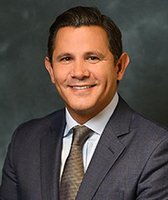Stand up for the facts!
Our only agenda is to publish the truth so you can be an informed participant in democracy.
We need your help.
I would like to contribute

Rep. Ilhan Omar, D-Minn., in the U.S. Capitol on Feb. 5, 2019. (AP)
A clip of Ilhan Omar saying Americans "should be more fearful of white men" took off on Twitter, but it includes some selective editing that doesn’t fully reflect her statements.
On July 25, Sen. Marco Rubio, R-Fla., shared a 41-second excerpt from Omar’s interview on Al Jazeera from February 2018, when she was a Minnesota state legislator, months before the Minnesota Democrat won a seat in Congress. The interviewer asks Omar what she would say to conservatives who say the rise of Islamophobia is due to "jihadist terrorism" attacks such as in San Bernardino and Fort Hood.
Omar responded with a comment about terrorism saying that "our country should be more fearful of white men across our country because they are actually causing most of the deaths within this country."
We have fact-checked similar statements before. We found that measuring terrorism or violence by white nationalists can be tricky because it depends upon the definitions. However, data from multiple sources suggest extremist attacks associated with white nationalism and far-right ideology is on the rise.
In sharing the video from a Daily Caller News Foundation reporter, Rubio tweeted, "I am sure the media will now hound every Democrat to denounce this statement as racist. Right?"
The clip has been viewed more than 5 million times.
It helps to watch Omar’s full 10-minute interview to understand her quote in context.
She was asked about other things — for example, President Donald Trump’s early policies to restrict travel from Muslim-majority countries and anti-Muslim discrimination in the United States — but we’ve focused on the relevant portion of the video when she was talking about terrorism.
Interviewer Mehdi Hasan: "Within just a few days of taking office President Trump brought in his infamous travel ban, the Muslim ban. You are not just a Muslim immigrant to the United States, you are a former Muslim refugee who is from one of the countries on the banned list: Somalia. Do you think President Trump doesn’t want people like you in the country because he says it’s not personal, its national security?’"
Omar: "If we were really being honest about what could be masqueraded as a national security issue we know that no one from any of these countries has ever posed a threat within this country. And so we know that for him and his supporters this is just a political football, and they are using our communities and people who look like me as leverage."
Later in the interview, Hasan asked her about terrorism.
Hasan: "A lot of conservatives in particular would say that the rise of Islamophobia is the result not of hate but of fear — a legitimate fear they say of ‘jihadist terrorism’ whether it’s Fort Hood or San Bernandino or the recent truck attack in New York. What do you say to them?"
Here is her full answer (we put the portion that was cut in the Twitter video in bold):
Omar: "I would say our country should be more fearful of white men across our country, because they are actually causing most of the deaths within this country. And so if fear was the driving force of policies to keep America safe, Americans safe inside of this country, we should be profiling, monitoring and creating policies to fight the radicalization of white men."
Hasan: "But most of the funding and attention even under Obama obviously went toward Muslim communities — one of those communities is in Minnesota, your state, the Somali American community in Minnesota where I think over past few years more than 20 young Somali Americans have left to go and fight for Isil or Al Shabab or one of these ‘jihadist groups’ abroad. That’s a real threat, obviously nobody is pretending it’s not a threat. So what do you do about it?"
Omar: "I think, like I said, the focus of our policies should be about keeping Americans safe, keeping us domestically safe, and where we actually find a solution is looking at our foreign policy, looking at how we are engaging with the members of these communities and the kind of rhetoric, right, that is being spewed out of leaders within our city halls, within our state capitals and within our nation’s capital."
Hasan: "Some would say that is true, there is really bad rhetoric coming from politicians, security leaders, etc., but also a lot of bad rhetoric coming from Muslim community leaders, imams, etc. Is that fair?"
Omar: "I think both of those statements could be true. And I think it just goes to show what happens when you have segments within communities that are using fear and hate to mobilize their base, and it is important for us to actually have a conversation about what kind of communities we are trying to build and what this nation actually stands for."
Our Sources
Al Jazeera UpFront, Interview with U.S. Rep. Ilhan Omar, Feb. 10, 2019
U.S. Sen. Marco Rubio, Tweet, July 25, 2019
U.S. Sen. Marco Rubio, Tweet, July 25, 2019
Fox News, In resurfaced interview, Ilhan Omar answers question on 'jihadist terrorism' by saying Americans should be 'more fearful of white men,' July 25, 2019
CNN, Reps. Omar and Schakowsky: We must confront threat of white nationalism -- together, May 14, 2019
Washington Post The Fact Checker, Rubio cries ‘racist’ after being duped by a misleading tweet and video, July 25, 2019
PolitiFact, Donald Trump doesn’t think white nationalism is on the rise. Data show otherwise. March 20, 2019
PolitiFact, A look at the data on domestic terrorism and who’s behind it, Aug. 16, 2017
PolitiFact, Fact-checking Cory Booker's statistic on attacks by white nationalist hate groups, Jan. 18, 2018
PolitiFact, Are there white nationalists in the White House? Aug. 15, 2017
PolitiFact, Is the Center for Immigration Studies a hate group, as the Southern Poverty Law Center says? March 22, 2017






























